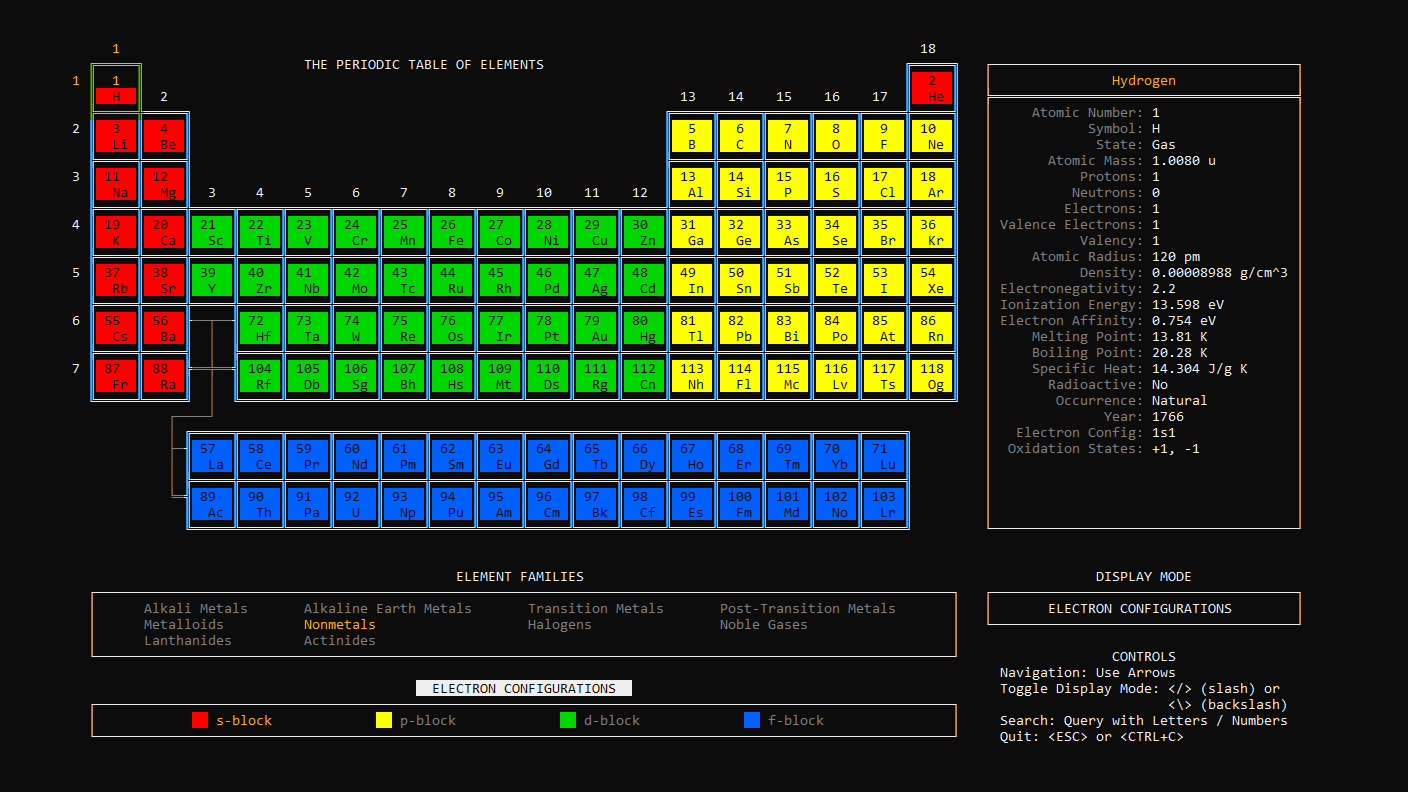periodic-table-cli is an interactive periodic table of elements program for the console.
The periodic table, in chemistry, is the organized array of all the chemical elements in order of increasing atomic number —i.e., the total number of protons in the atomic nucleus.
This is free and open source software.
Features include:
- Use the arrow keys to navigate and browse across all 118 elements. The selected element appears in gold on the Periodic Table on the left, and 22 data points for that element will display on the right.
- Browse all 10 element families.
- Browse all 4 electron configurations.
- Search – use letters or numbers to query for an element, family, or electron configuration. Queries are matched on element names, symbols, and atomic numbers, along with family names and electron configuration names.
- Display modes:
- Element families – 10 color-coded element families.
- Electron configurations – 4 color-coded electron shell.
- Standard state – display whether an element is a solid (white), liquid (red), or gas (blue).
- Atomic mass – heat-map of atomic mass (increasing from blue to red).
- Protons – heat-map of the number of protons (increasing from blue to red).
- Neutrons – heat-map of the number of neutrons (increasing from blue to red).
- Electrons – a heat-map of the number of electrons (increasing from blue to red).
- Valence electrons – a color-coded representation of the number of valence electrons.
- Valency – color-coded representation of valency
- Atomic radius – heat-map of atomic radius (increasing from blue to red).
- Density – heat-map of density (increasing from blue to red).
- Electronegativity – heat-map of electronegativity (increasing from blue to red)
- Ionization energy – heat-map of ionization energy (increasing from blue to red).
- Electron affinity – heat-map of electron affinity (increasing from blue to red).
- Melting point – heat-map of melting point (increasing from blue to red).
- Boiling point – heat-map of boiling point (increasing from blue to red).
- Specific heat – heat-map of specific heat (increasing from blue to red).
- Radioactivity – display which elements are radioactive (red) and stable (green).
- Occurrence – display which elements have a natural occurrence (blue), rare occurrence (orange), or artificial occurrence (yellow).
- Year – heat-map of the year each element was discovered (increasing from blue to red). Ancient elements appear in white.
- Data mode – displays a brief list of all the elements, including atomic number, element symbol, and element name.
- Chart mode – prints a non-interactive Periodic Table of Elements.
Website: spirometaxas.com/projects/periodic-table-cli
Support: GitHub Code Repository
Developer: Spiro Metaxas
License: MIT License

periodic-table-cli is written in JavaScript. Learn JavaScript with our recommended free books and free tutorials.
Return to Periodic Table Tools
| Popular series | |
|---|---|
| The largest compilation of the best free and open source software in the universe. Each article is supplied with a legendary ratings chart helping you to make informed decisions. | |
| Hundreds of in-depth reviews offering our unbiased and expert opinion on software. We offer helpful and impartial information. | |
| The Big List of Active Linux Distros is a large compilation of actively developed Linux distributions. | |
| Replace proprietary software with open source alternatives: Google, Microsoft, Apple, Adobe, IBM, Autodesk, Oracle, Atlassian, Corel, Cisco, Intuit, SAS, Progress, Salesforce, and Citrix | |
| Awesome Free Linux Games Tools showcases a series of tools that making gaming on Linux a more pleasurable experience. This is a new series. | |
| Machine Learning explores practical applications of machine learning and deep learning from a Linux perspective. We've written reviews of more than 40 self-hosted apps. All are free and open source. | |
| New to Linux? Read our Linux for Starters series. We start right at the basics and teach you everything you need to know to get started with Linux. | |
| Alternatives to popular CLI tools showcases essential tools that are modern replacements for core Linux utilities. | |
| Essential Linux system tools focuses on small, indispensable utilities, useful for system administrators as well as regular users. | |
| Linux utilities to maximise your productivity. Small, indispensable tools, useful for anyone running a Linux machine. | |
| Surveys popular streaming services from a Linux perspective: Amazon Music Unlimited, Myuzi, Spotify, Deezer, Tidal. | |
| Saving Money with Linux looks at how you can reduce your energy bills running Linux. | |
| Home computers became commonplace in the 1980s. Emulate home computers including the Commodore 64, Amiga, Atari ST, ZX81, Amstrad CPC, and ZX Spectrum. | |
| Now and Then examines how promising open source software fared over the years. It can be a bumpy ride. | |
| Linux at Home looks at a range of home activities where Linux can play its part, making the most of our time at home, keeping active and engaged. | |
| Linux Candy reveals the lighter side of Linux. Have some fun and escape from the daily drudgery. | |
| Getting Started with Docker helps you master Docker, a set of platform as a service products that delivers software in packages called containers. | |
| Best Free Android Apps. We showcase free Android apps that are definitely worth downloading. There's a strict eligibility criteria for inclusion in this series. | |
| These best free books accelerate your learning of every programming language. Learn a new language today! | |
| These free tutorials offer the perfect tonic to our free programming books series. | |
| Linux Around The World showcases usergroups that are relevant to Linux enthusiasts. Great ways to meet up with fellow enthusiasts. | |
| Stars and Stripes is an occasional series looking at the impact of Linux in the USA. | |
